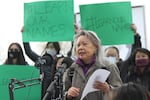Nooses left in schoolyards and on people’s doorsteps. Pride flags torn down and burned. Places of worship defaced and damaged. Threats of violence, rape and death.
These are among the nearly 6,000 reports of bias incidents and crimes the Oregon Department of Justice’s Bias Response Hotline has received in the three years since the program launched, according to a state report released this month.

FILE - In this Monday, July 20, 2020, file photo, Romeo Ceasar holds a sign during a Black Lives Matter protest in Portland, Ore. Many Black protesters say the large crowds in response to the deployment of federal agents to the city have helped focus attention on their demonstrations against inequality and racism.
Noah Berger / AP
The effects of bias incidents and crimes can have lasting harm on people and their communities. The report describes the hateful acts as attempts to dehumanize, silence and frighten people.
“The word bias itself is a euphemism, attempting to reduce the impact for the user — in actuality, we are talking about hate: racism, discrimination, homophobia, transphobia, anti-Semitism, Islamophobia, colorism, ableism, xenophobia, casteism, linguisticism, and audism,” wrote report authors from the Oregon Criminal Justice Commission, a state agency that helps develop criminal justice policy.
Calls to the state Justice Department hotline increased 74% from 2021 to 2022. Last year, the hotline received 2,534 reports of bias incidents and crimes. Despite the rise, “underreporting is extensive,” the report states. The confidential hotline doesn’t investigate each report but does help callers connect with resources after experiencing a bias incident or crime. Sometimes that includes helping the caller make a report to police.
DOJ officials point out that while they are alarmed by the reports, the hotline is still relatively new and increased calls are a sign that people are discovering it.
When extremist rhetoric targeting various groups becomes more common, the report states, there’s often an increase in bias crimes.

Antisemitic graffiti was found sprayed on an exterior wall of the Congregation Beth Israel temple in Northwest Portland on Monday, May 2, 2022.
Congregation Beth Israel
“In other words, as rhetoric about Jewish conspiracies, LGBTQIA2S+ and transgender rights increased in 2022 and became mainstream, this was reflected in increases in antisemitic, anti-sexual orientation and anti-gender identity bias-motivated attacks,” the document says.
The document lists a number of key findings from the past year, including:
- Anti-Black/African American bias continues to be the largest category, making up a quarter of the reports.
- As schools have reopened after the pandemic, reports of bias incidents there have also increased from 36 in 2020 to 408 reports last year.
- Bias-motivated reports targeting people who identify as LGBTQ+ increased between 2021 and last year, with reports targeting sexual orientation up 97% and gender identity up more than 150%.
- Reports targeting religion also increased, with antisemitic reports making up 75% of anti-religious reports since 2020.
- Anti-Asian reports decreased slightly last year compared to 2021 when such reports rose as a result of hateful rhetoric related to the COVID-19 pandemic.
- Less than one-third of people charged with a bias crime last year were convicted of any charge. Most defendants, according to the report, are sentenced to probation, and few go to prison on a bias charge conviction. The report notes that some prosecutors may be incorrectly classifying hateful behavior as mental health issues. It suggested more research on the topic.
“Remember, these are people behind each and every one of these reports,” said Fay Stetz-Waters, director of civil rights for the Oregon Department of Justice. “It’s courageous for people to be able to share what happened to them.”
Stetz-Waters said she was particularly concerned about the rise of reports of hate and bias in educational settings.
“It’s troubling to see young people having to try to learn in this environment,” she said. “It’s troubling to see teachers struggling to control classrooms when these things happen.”

In this file photo from 2010, Oregon small business owner Christine Chin Ryan speaks out at a rally held at Revolution Hall in southeast Portland, responding to the shooting in Atlanta where six women of Asian descent were killed. Ryan said former president Donald Trump has left a legacy of bigotry, violence, white supremacy and deep-seated structural racism.
Kristian Foden-Vencil
The ACLU of Oregon’s Sandy Chung said she’s concerned about what she sees as an increase in hateful rhetoric pushed by politicians.
“When electeds in local school boards or in the state Legislature use dehumanizing approaches, language or tactics against trans people, racial justice protesters, or other historically disenfranchised or marginalized communities, some people run with that as permission to engage in hate,” Chung said.
The commission’s report notes that bias crimes are often perpetrated by groups of people rather than individuals.
Last month, the Anti-Defamation League and queer advocacy group GLAAD released a report that tracked more than 350 incidents across the country of harassment, assault and vandalism against the LGBTQ+ community between June 2022 and April. That report found 49% of incidents nationally were carried out “wholly or substantially” by people associated with extremist groups.
In its report, the commission outlined several recommendations, including continued outreach efforts by the DOJ hotline to culturally specific community organizations as well as the state Department of Education. It also recommends creating a treatment program for bias crime perpetrators.
